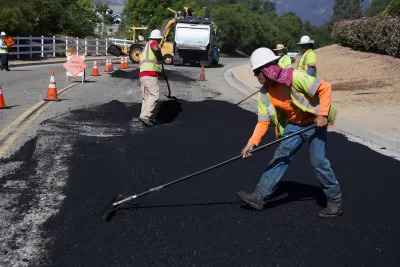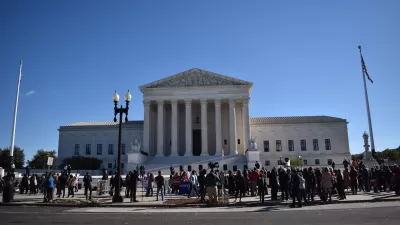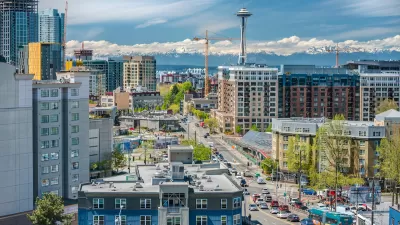A California property owner took El Dorado County to state court after paying a traffic impact fee he felt was exorbitant. He lost in trial court, appellate court, and the California Supreme Court denied review. Then the U.S. Supreme Court acted.

In a 9-0 court decision on April 12, the U.S. Supreme Court "ruled that developers and home builders in California may challenge the fees commonly imposed by cities and counties to pay for new roads, schools, sewers and other public improvements," reported David G. Savage for the Los Angeles Times on April 12.
[Related: "California Impact Fees Reach Supreme Court," October 4, 2023]
Background
"The case arose when property owner George Sheetz sought a permit to put a manufactured home on a lot he owned in Placerville, outside Sacramento. El Dorado County required him to pay a “traffic impact mitigation” fee to obtain the permit," adds Savage. The fee was $23,420.
Some of the money was to go toward upgrades to Highway 50, which runs through the area, but most was to go toward new or expanded roads in the county.
At issue is how to view impact fees, "payments required by local governments of new development for the purpose of providing new or expanded public capital facilities required to serve that development," according to an American Planning Association policy guide ratified in April 1997, and their relationship with the Takings Clause of the Fifth Amendment of the U.S. Constitution.
Can impact fees be considered a "taking" if inappropriately applied?
Savage continues:
Writing for the court in Friday’s ruling [pdf], conservative Justice Amy Coney Barrett said that “there is no basis for affording property rights less protection in the hands of legislators than administrators. The Takings Clause applies equally to both — which means that it prohibits legislatures and agencies alike from imposing unconstitutional conditions on land-use permits.”
JD Supra, a leading resource for law firms, explained the ruling in similar terms in the first paragraph of their summary of the decision:
On April 12, 2024, the United States Supreme Court decided Sheetz v. El Dorado County, No. 22-1074, holding that the Takings Clause “does not distinguish between legislative and administrative permit conditions,” but instead “prohibits legislatures and agencies alike from imposing unconstitutional conditions on land-use permits.”
The article adds that Sheetz paid the fee but claimed that it "constituted an unlawful 'exaction' of money in violation of the Takings Clause."
Yes, California's impact fees have been shown to be excessive, according to a related post:
What's needed?
Savage of the the Times spoke with state Sen. Scott Wiener ( D-San Francisco), author some of the state's most far-reaching housing legislation, regarding the decision.
“Ultimately, the solution is the same today as it was yesterday,” Wiener said. “The California Legislature needs to put in place an actual structure for impact fees. Right now, it’s all over the map.”
As for Mr. Sheetz, it's back to state court, as Justice Barrett directed at the end of the majority opinion:
The judgment of the California Court of Appeal is vacated, and the case is remanded for further proceedings not inconsistent with this opinion.
It is so ordered.
Additional reading, related posts:
- San Mateo Daily Journal: SCOTUS ruling upends how cities charge development impact fees regionally and statewide, Apr 13, 2024
- Planning Report: Nollan-Dolan "Taking" Doctrine: Landmark Supreme Court Cases? August 30, 1994
- Justice Scalia and the Takings Clause, February 18, 2016
- U.S. Supremes Tighten the Screws on Exactions, June 26, 2013
FULL STORY: Builders may fight ‘impact fees’ that fund municipal projects in California, Supreme Court rules

Alabama: Trump Terminates Settlements for Black Communities Harmed By Raw Sewage
Trump deemed the landmark civil rights agreement “illegal DEI and environmental justice policy.”

Planetizen Federal Action Tracker
A weekly monitor of how Trump’s orders and actions are impacting planners and planning in America.

The 120 Year Old Tiny Home Villages That Sheltered San Francisco’s Earthquake Refugees
More than a century ago, San Francisco mobilized to house thousands of residents displaced by the 1906 earthquake. Could their strategy offer a model for the present?

Ken Jennings Launches Transit Web Series
The Jeopardy champ wants you to ride public transit.

BLM To Rescind Public Lands Rule
The change will downgrade conservation, once again putting federal land at risk for mining and other extractive uses.

Indy Neighborhood Group Builds Temporary Multi-Use Path
Community members, aided in part by funding from the city, repurposed a vehicle lane to create a protected bike and pedestrian path for the summer season.
Urban Design for Planners 1: Software Tools
This six-course series explores essential urban design concepts using open source software and equips planners with the tools they need to participate fully in the urban design process.
Planning for Universal Design
Learn the tools for implementing Universal Design in planning regulations.
Clanton & Associates, Inc.
Jessamine County Fiscal Court
Institute for Housing and Urban Development Studies (IHS)
City of Grandview
Harvard GSD Executive Education
Toledo-Lucas County Plan Commissions
Salt Lake City
NYU Wagner Graduate School of Public Service





























